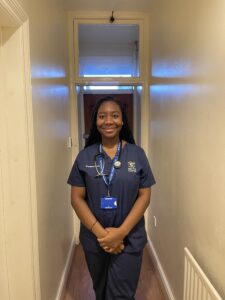Funding boost will see more than 1,000 new doctors training in the North West
 MORE than 1,000 new doctors could be trained at North West universities in 2024 after the NHS announced it was funding an additional 105 medical school places from September to train more medics for the region’s hospitals and surgeries.
MORE than 1,000 new doctors could be trained at North West universities in 2024 after the NHS announced it was funding an additional 105 medical school places from September to train more medics for the region’s hospitals and surgeries.
The increase in medical places comes in advance of the larger expansion across the country from 2025 onwards that will deliver the NHS Long Term Workforce Plan commitment to double medical school places by 2030 to 2031.
Chris Cutts, Regional Director of Workforce, Training and Education at NHS England North West, said: “We’re really excited to be delivering extra medical school places in the North West. This means there will be more doctors for our hospitals and surgeries in the future. The courses are hugely popular and competitive and it is brilliant that these talent pipelines have been created, something that is all the more better in the long run. This is all about training the next generation of doctors and investing in the NHS.
“The location of these schools in our part of the country will also help ensure medical school places are available where they are most needed, including training much-needed additional doctors for the North West, which is a great place to live and work and because of this we do attract a large number of students.”
The increase means that more students will be able to take up medicine at universities that are close to home.
Registered nurse Hannah Jefferson is a mature student who is now in the second year of her medicine degree at the University of Central Lancashire (UCLan). As someone with a family, for Hannah finding a university close to home was important.
Hannah said: “As a mature student with a family, it was essential that I was able to attend a university within commuting distance from my home in Manchester. Fortunately, UCLan has a fantastic pre-school. I’m hoping the additional places will provide more opportunity for women like me to be able to have a family and pursue a career simultaneously.
“Offering domestic students the opportunity to train as doctors in their home county demonstrates the commitment of NHS England working towards doubling medical school places by 2031. These additional places of domestically recruited students will inevitably benefit future patients in an NHS that is ever-expanding.”
The NHS is also working with local universities to encourage students from underrepresented groups to become doctors.
Edge Hill University, for instance, provides a medicine programme with foundation year for students from the North West who have the potential and aspiration to become doctors but whose background may mean it is less likely they will be able to meet the academic requirements for direct entry.
Professor Mini Singh, Director of the Medical School at Edge Hill University, said: “We are excited to be expanding our ambition to train the next generation of much-needed doctors. With more than three quarters of our medical students being from underrepresented groups we will continue to play a key part in ensuring more new doctors represent and understand the needs of the communities they serve here in the North West.”
Eleni Liami, a medical student at Edge Hill University from Southport, said: “Medicine has always been a competitive profession to get into so it’s great news that university places are being increased. The NHS needs more doctors so hopefully this will help manage the shortage, especially in the North West. This area is socio-economically deprived, and Edge Hill University’s goal is to train doctors who will graduate and work in the local community, so getting an extra 20 places will definitely make a difference and have a positive impact on patient care in the future.”
Oluwadamilola Emitola, a medical student at Edge Hill University from Manchester, said: “This initiative is an investment in the future and will go a long way to bridging health disparities in the North versus the South. Providing more medical school spaces to the North West will produce local doctors with a better understanding of their communities, who can provide tailored healthcare experiences for their patients.
“For patients the benefits are endless: reduced waiting times for emergency services and GP practices; increased quality of patient care, as the patient-to-doctor ratio will considerably improve; funding boosts to their communities to provide more facilities and access to care. The future looks promising.”
In the North West, the University of Chester will be providing medical places for the first time. Places have also been increased at the University of Central Lancashire and Edge Hill University.
Professor Arpan Guha, Dean & Consultant in Critical Care Medicine at the University of Chester, said: “We’re delighted to provide publicly funded medical places for the first time at the University of Chester. These places will start in September and make a positive difference to people in the North West. We would like to thank NHS England for this opportunity to work together to strengthen the medical workforce provision in the UK.”
In addition to medical places at Edge Hill University, the University of Central Lancashire and the University of Chester, the NHS also funds medical places at the University of Liverpool, the University of Manchester and the University of Lancaster.
The NHS Long Term Workforce Plan, the first-of-its-kind plan for the NHS, sets out a series of interventions to train, retain and reform the workforce and put the NHS on a sustainable footing into the future. The plan is backed by more than £2.4 billion in investment. It also sets out how the NHS will address existing vacancies and meet the challenges of a growing and aging population by recruiting and retaining hundreds of thousands more staff over the next 15 years and reforming the way they work.
